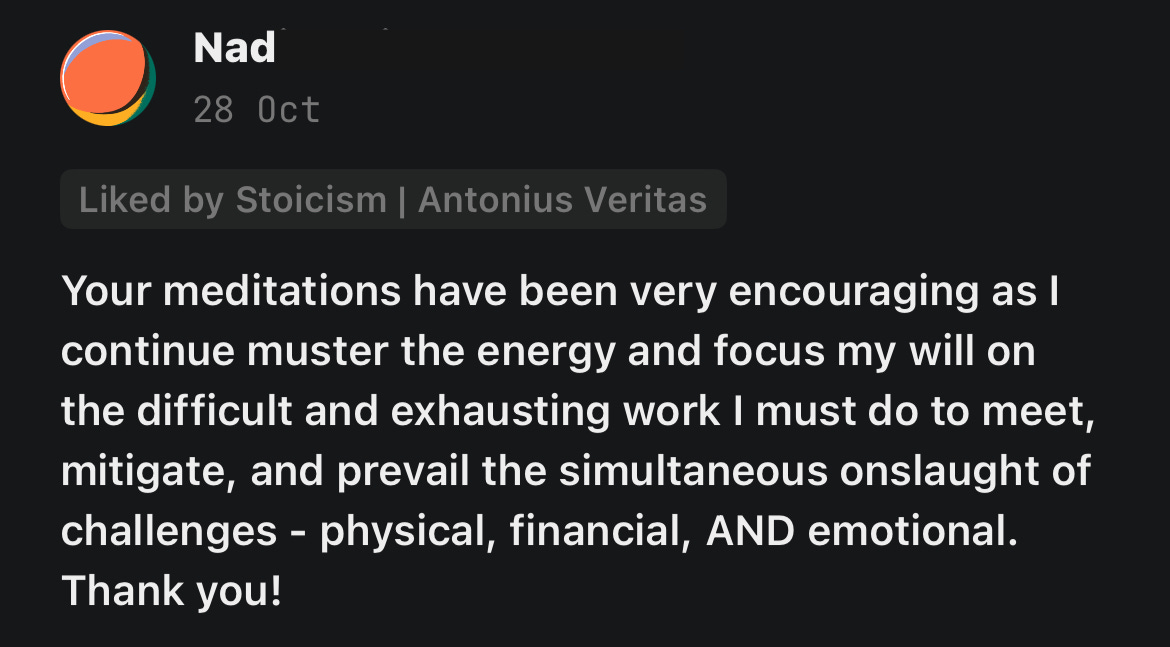“Assemble your life…action by action. And be satisfied if each one achieves its goal…No one can keep that from happening…Action by action.” — Marcus Aurelius
We talked about the unconventional way to overcome bad habits — by making them unattractive through repetitive exposure.
Today we'll look at how to build better ones.
It's the key to unleashing our potential and do great work.
Be useful to the people around us. Earn a living.
Become fit and healthy. Be strong enough to carry our grandchildren.
Set an admirable example for those who look up to us and posterity. Inspire a better society.
It's also the key to happiness because we're living a life in accordance with our nature1.
“So how does one get there?”
Epictetus asked his students.
He gives us the following steps to acquire better habits which I’ve elaborated in the numbered sub-headings,
Start by wanting to please yourself, for a change, and appear worthy in the eyes of God.
Desire to become pure, and, once pure, you will be at ease with yourself, and comfortable in the company of God.
Then, as Plato said, when a dangerous impression confronts you, go and expiate the gods with sacrifice, go to the temples to supplicate the gods for protection.
It will even do to socialize with men of good character, in order to model your life on theirs, whether you choose someone living or someone from the past."
Next is to practice.
In another passage, Epictetus tells us that we’re getting better at whatever we’re doing.
So it’s wise to be mindful of our actions and what we pay attention to so that in the end it all stacks up in our favor.
“Every habit and faculty is formed or strengthened by the corresponding act – walking makes you walk better, running makes you a better runner.
If you want to be literate, read, if you want to be a painter, paint.
Go a month without reading, occupied with something else, and you’ll see what the result is.
And if you’re laid up a mere ten days, when you get up and try to walk any distance you’ll find your legs barely able to support you.
So if you like doing something, do it regularly; if you don’t like doing something, make a habit of doing something different." — Epictetus
We’re either becoming strong or weak.
There’s no in between.
These are the steps to building better habits.
1. Want the Best for Yourself
Love yourself enough to want to manifest the greatness that's truly yours.
Understand you’re worthy of it all because,
“It’s a fight for autonomy, freedom, happiness and peace.” — Epictetus
Strength equals ease — We’ve covered in length on why you should desire to be as powerful and as strong as you can possibly be to enjoy your life.
2. Desire to Live in Pure Flow
“All the power and knowledge available in the universe are accessible to the man who lives in perfect harmony with nature.” — Marcus Aurelius
Living in harmony is better than chasing excitement.
Harmony gives us the joy of knowing we’ve used our full human capabilities, rationality and being pro-social, to live as best as we can.
In the tough times we can recall what we’ve had the power to endure and what we’ve accomplished so far which gives us joy, confidence and the reassurance that we’re doing well.
On the other hand, excitement is ephemeral, it leaves us more depressed than we were and positions us to chase more so we can feel better.
That’s how unhealthy addictions are born which then disadvantage our finances, relationships and work because we live in worship of pleasure. We’ll do anything to get it.
Who would you rather be … a great man or a slave?
3. Pray to God
Building better habits will get tough.
You’ll be wise to expect it so you can do something about it.
Some event will try to throw us off our game but we can’t give in — we have to find a way to keep going and this is by saying this intentional prayer by Reinhold Niebuhr.
It’s mental jiu-jitsu.
God grant me the serenity
To accept the things I cannot change;
Courage to change the things I can;
And wisdom to know the difference.
Living one day at a time;
Enjoying one moment at a time;
Accepting hardships as the pathway to peace;
Taking, as He did, this sinful world
As it is, not as I would have it;
Trusting that He will make all things right
If I surrender to His Will;
So that I may be reasonably happy in this life
And supremely happy with Him
Forever and ever in the next.
Amen.
Then we’ll be wise to adapt.
This is whereby instead of doing the bulk of what we’re used to, we can opt for a smaller or faster version of it that’ll ensure we make even the tiniest progress possible.
Isn’t a little progress better than nothing?
It’s better than breaking our momentum and getting back on track months later.
Or never.
If we can’t write the 1000 words for our book, we can write a 50 word note.
If we can’t commit to a full hour at the gym, we can do a home workout for 10 minutes.
If we don’t have the time to text back our friends, we can call them and have a quick chat.
The key is to keep going. We’re in this for life.
Short-term discomfort or promise of comfort can’t deter us when we flow like water.
However, if you struggle to maintain high energy levels, focus, or feel depressed, you can take a look at ‘The Tools’, a book I wrote because I was struggling with the same issues while training in medical school.
4. Emulate a Role Model.
“Choose someone whose way of life as well as words, and whose very face as mirroring the character that lies behind it, have won your approval.
Be always pointing him out to yourself either as your guardian or as your model.
There is a need, in my view, for someone as a standard against which our characters can measure themselves.
Without a ruler to do it against you won’t make the crooked straight.” — Seneca
Having the figure of a role model in our minds helps us embody the spirit of how they’d act when cultivating better habits.
We imagine how they’d fight temptation and persist when it’s tough then get more fuel to move past our obstacles.
This step also helps us feel the interconnectedness of being human.
We’re not alone in our struggles and everyone is doing their best to fulfil the greatness that is truly theirs.
Mentors and biographies of people we admire help us get these role models.
5. Practice Everyday
“Practice,” the habit ,”regularly, and you’ll see what shoulders, what muscles, what stamina you acquire2.” — Epictetus
Practice is how we get good at anything — through our brain’s neuroplasticity.
But we must make practice easy and fun for sustainability.
It's prudent to attack what we have to do with energy and agility early in the day.
Hesitation is the enemy of this stratagem.
It increases the chances of procrastination — then the days, weeks, months, years pass by and we're still stagnant. Still mediocre.
We deteriorate when we hesitate. Epictetus tells us,
Do you like this meditation so far? ⭐️
Support the publication to read the rest and access 100+ premium essays & meditations.
Here’s what other readers are saying…







